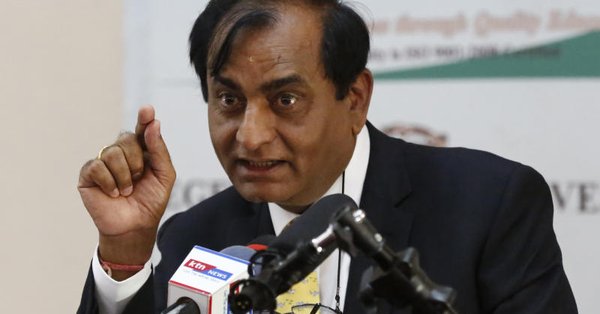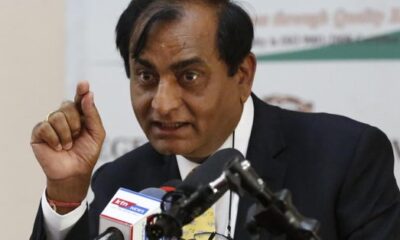Business
Devki Boss Narendra Raval Loses Lucrative Mining Deal as Auditor-General Flags Unfair Levy
The levy concession was just one element in Raval’s aggressive expansion strategy that has transformed him into one of Kenya’s wealthiest industrialists.

Steel and cement magnate’s preferential mining tariff revoked after audit reveals Sh193 million underpayment
Billionaire industrialist Narendra Raval has been stripped of a lucrative mining levy concession that saved his cement company millions of shillings, following sustained pressure from the Auditor-General who flagged the arrangement as illegal and unfair to competitors.
The revocation of the preferential rate by the State Department of Mining marks a significant setback for the Devki Group chairman, whose National Cement Company had been paying a reduced levy of Sh100 per tonne compared to the standard Sh140 rate imposed on rival cement manufacturers.
Auditor-General Nancy Gathungu revealed in her latest report that the concessionary arrangement, which had been in place since 2020, lacked legal backing and created an uneven playing field in Kenya’s cement industry.
The audit findings show that between July 2020 and March 2022, Raval’s company underpaid cement levies by Sh193.2 million on 6.19 million tonnes of cement produced.
“The management submitted that the State Department of Mining issued a revocation for the preferential rate and the company is now paying at the common rate,” Gathungu stated in her July report, confirming the end of what critics had labeled a “sweetheart deal.”
The controversy stems from a March 2021 letter from the Cabinet Secretary for Mining that authorized National Cement to pay the reduced rate.
However, Gathungu’s audit revealed that this authorization was issued without any existing regulatory framework to support such concessions.
“Although a letter from the CS dated 14 March, 2021 provided for audit authorised the company to pay a reduced cement levy rate different from the gazette rate of Sh140 per ton, the letter was not based on any existing regulations as required,” the audit report noted.
The Royalty Collection and Management Regulations, which would have provided the legal framework for such concessions, were only gazetted in 2024 – three years after Raval’s company began enjoying the preferential treatment.
The preferential levy arrangement had drawn sharp criticism from parliamentarians, who in February 2024 adopted a National Assembly report demanding uniform levies across the cement sector.
The MPs argued that the arrangement gave National Cement an unfair competitive advantage worth approximately Sh10 million monthly.
Lawmakers had given the government one year to revoke the concession and demanded that Raval’s company reimburse the state for the benefits received during the period of preferential treatment.
The levy concession was just one element in Raval’s aggressive expansion strategy that has transformed him into one of Kenya’s wealthiest industrialists.
His National Cement Company, operating under the Simba Cement brand, has emerged as the top player in Kenya’s cement market, overtaking established rivals like East Africa Portland Cement and Bamburi Cement.
Raval’s empire spans multiple sectors, with recent acquisitions including the Kenyan assets of bankrupt Athi River Mining for Sh5 billion and Rwanda’s oldest cement manufacturer, CIMERWA Plc.
His company operates cement factories in Emali, Nakuru, and West Pokot counties, with a major Sh30.3 billion clinker plant launched in Kajiado County in 2018.
Beyond cement, Raval is positioning himself as a major player in steel production, with plans for Kenya’s first virgin steel production facility.
The Sh45 billion plant in Kwale County, unveiled by President William Ruto in late 2022, will be fed by iron ore from Uganda and represents one of the few such facilities on the continent.
The proximity to political power has been evident in Raval’s business dealings.
President Ruto graced the opening of the tycoon’s clinker plant in West Pokot in April 2024, while Raval maintained close ties with former President Uhuru Kenyatta.
For Raval, whose business empire began with a small steel rolling mill near Athi River in 1992, the loss of the levy concession is unlikely to significantly impact his diversified operations.
However, it signals a shift toward more transparent and equitable regulatory practices in Kenya’s mining and manufacturing sectors.
Kenya Insights allows guest blogging, if you want to be published on Kenya’s most authoritative and accurate blog, have an expose, news TIPS, story angles, human interest stories, drop us an email on [email protected] or via Telegram
-

 Grapevine5 days ago
Grapevine5 days agoAlleged Male Lover Claims His Life Is in Danger, Leaks Screenshots and Private Videos Linking SportPesa CEO Ronald Karauri
-

 Lifestyle1 week ago
Lifestyle1 week agoThe General’s Fall: From Barracks To Bankruptcy As Illness Ravages Karangi’s Memory And Empire
-

 Americas2 weeks ago
Americas2 weeks agoEpstein Files: Bill Clinton and George Bush Accused Of Raping A Boy In A Yacht Of ‘Ritualistic Sacrifice’
-

 Investigations1 week ago
Investigations1 week agoEpstein Files: Sultan bin Sulayem Bragged on His Closeness to President Uhuru Then His Firm DP World Controversially Won Port Construction in Kenya, Tanzania
-

 News2 weeks ago
News2 weeks agoAUDIT EXPOSES INEQUALITY IN STAREHE SCHOOLS: PARENTS BLED DRY AS FEES HIT Sh300,000 AGAINST Sh67,244 CAP
-

 Business2 weeks ago
Business2 weeks agoKRA Can Now Tax Unexplained Bank Deposits
-

 Grapevine1 day ago
Grapevine1 day agoRussian Man’s Secret Sex Recordings Ignite Fury as Questions Mount Over Consent and Easy Pick-Ups in Nairobi
-

 Investigations1 week ago
Investigations1 week agoEpstein’s Girlfriend Ghislaine Maxwell Frequently Visited Kenya As Files Reveal Local Secret Links With The Underage Sex Trafficking Ring

















